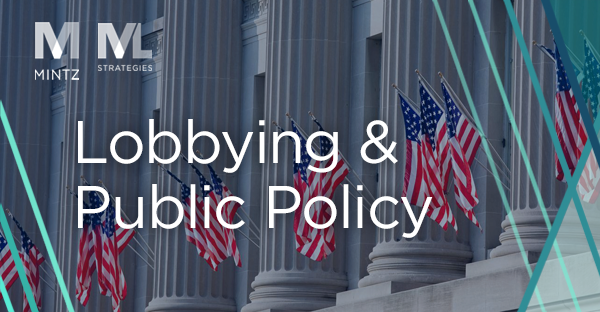
ML Strategies
Viewpoints
Filter by:
Look Ahead: Fall Preview of Key Biden Administration Initiatives
August 19, 2021 | Blog
The second half of 2021 will be a busy stretch for Congress. In addition to the typical must-pass legislation, Democrats controlling both chambers and the White House are committed to several big spending bills, too. This preview is a rundown of these bills, what’s included in them, and how we can expect them to play out.
Read more
New Laws Possible in Massachusetts - Proponents Set Sights on 2022 Ballot
August 6, 2021 | Blog | By Steven Baddour, Daniel Connelly, Caitlin Beresin, Kaitlyn Sprague, Taylor Shepherd
Those seeking to amend Massachusetts law or the Massachusetts Constitution through the state’s unique ballot initiative process had until Wednesday, August 4, 2021 to file their proposals with the Massachusetts Attorney General’s Office. By the time the deadline was reached, 30 proposals were filed.
Read more
Energy & Sustainability Washington Updates - August 2021
August 2, 2021 | Blog | By R. Neal Martin
Energy & Sustainability Washington Updates - July 2021
July 16, 2021 | Blog | By R. Neal Martin
Cyber Policy Legislative Tracker
May 5, 2021 | Resources | By Alexander Hecht, Christian Tamotsu Fjeld
The bills listed reflect a relatively active cybersecurity agenda for the 117th Congress. As reflected in the proposed legislation, many Members are interested in focusing federal policy on matters such as supply chain security, cyber workforce training, and international competitiveness, particularly with China. The most ambitious bill may be the Endless Frontiers Act, which would establish a Directorate for Technology and Innovation within the National Science Foundation and further establish regional hubs (i.e., partnerships between government, private, and academic stakeholders) to drive R&D and commercial innovation in key areas of technology. Endless Frontiers could be the centerpiece of a legislative agenda to ramp up the U.S.’s technological competitiveness with China. The Senate Commerce Committee was scheduled to mark-up the bill last Wednesday, but it was pulled after over 230 amendments were reportedly filed, and Members failed to garner a critical mass of bipartisan support. The committee will likely work through the recess to seek bipartisan agreement for passage.
Read more
House Republicans Reverse Course on Earmarks, Congressionally Directed Spending is Back
March 18, 2021 | Blog | By Frank C. Guinta, Anthony DeMaio
Since the Democrats reclaimed control of the House of Representatives in 2018, barrels of ink have been spilled on the topic of “congressionally-directed spending”. Better known as earmarks, this funding mechanism allows Members of Congress to send money directly to projects identified in their districts, largely bypassing the federal bureaucracy and its protracted grant application process. For more than a decade, the Congress has banned the practice of including congressionally-directed funding in spending bills. Now, Democrats in control of both chambers and the White House are poised to bring earmarks back. On March 17th, House Republicans voted to reverse the GOP Conference’s ten year-old ban on congressionally directed spending, paving the way for Members from both parties to make requests in upcoming spending and infrastructure bills.
Read more
Hearings on the SolarWinds Hack and Possible Policy Responses
March 4, 2021 | Blog | By Christian Tamotsu Fjeld
The 117th Congress kicked off its First Session with, among other initiatives, oversight hearings on the SolarWinds cyber hack. On February 23, the Senate Intelligence Committee held a hearing on the high profile, far-reaching breach; followed by a joint hearing on February 26 in the House of Representatives held by the Oversight and Reform and Homeland Security Committees. At both hearings, Sudhakar Ramakrishna, President and CEO of SolarWinds, Kevin Mandia, CEO of FireEye, and Brad Smith, President and Chief Legal Officer of Microsoft, testified. In addition, George Kurtz, the President and CEO of Crowdstrike, testified at the Senate Intelligence hearing, while Kevin Thompson, the former CEO of SolarWinds, testified in front of the joint House hearing. Together, the hearings represent what will likely be the first of several congressional forays into the SolarWinds hack, including possible legislative initiatives to address future possible incidents and supply chain security.
Read more
As Walsh Awaits Confirmation Vote, DOL Priorities Take Shape
February 16, 2021 | Blog | By Anthony DeMaio, R. Neal Martin
Last week, the Senate Committee on Health, Education, Labor, and Pensions voted 18-4 to advance Boston Mayor Marty Walsh’s nomination for labor secretary. The bipartisan approval signals a non-controversial confirmation vote of the full Senate. When that occurs, Secretary-designate Walsh will take over a department that is front and center in the nascent Biden administration. Executing White House priorities including the federal response to the COVID-19 pandemic, addressing the climate crisis, and reversing certain Trump era actions, will soon be Walsh’s responsibility. His experience in Massachusetts politics gives a sense of how Walsh will approach his new post.
Read more
Transportation & Infrastructure: What to Expect from the Biden Administration & 117th Congress
February 4, 2021 | Blog | By Christian Tamotsu Fjeld, R. Neal Martin, Anthony DeMaio
With Democratic majorities in the U.S. House and U.S. Senate, Congress and President Biden’s new administration are working to quickly advance proposals to provide for economic relief as the nation continues to reel from the now nearly one-year pandemic. One area of emerging bipartisan focus is a long-sought measure to address the nation’s crumbling and outdated infrastructure, which could be paired with a required surface transportation reauthorization bill.
Read more
Energy & Sustainability: What to Expect from the 117th Congress and the Biden Administration
January 15, 2021 | Blog | By R. Neal Martin
After what felt like one of the longest election seasons in history, Washington is preparing to welcome the incoming administration of President-elect Joe Biden and Vice President-elect Kamala Harris. Meanwhile, Capitol Hill adjusts to a dramatic shift in power as Democrats achieved an election night stunner by winning both Senate run-off elections in Georgia on January 5, sending Rev. Raphael Warnock and Jon Ossoff to Washington and giving Democrats a 50-seat majority with the new incoming vice president casting any tie votes. In the House of Representatives, Republicans narrowed the Democrats’ majority in November but are still in the minority and Rep. Nancy Pelosi (D-CA) has been reelected to serve as Speaker of the House.
Read more
Action Items on Technology and Communication Policies in front of the Senate Commerce Committee
January 14, 2021 | Blog | By Christian Tamotsu Fjeld, Christopher Harvie
Looking Ahead: FDA in 2021
January 8, 2021 | Blog
Politics will have an effect on FDA policies in 2021, including with respect to the ongoing COVID-19 response, manufacturing, compliance, digital health, laboratories, user fees, device servicing, and more.
Read more
FDA in 2020: What a Year!
December 15, 2020 | Blog | By Benjamin Zegarelli
What a year for the Food and Drug Administration! FDA, an agency with regulatory oversight of 20-25% of products on which consumers spend, including food and medicines, but which typically stays out of the limelight, was thrust into the public eye amidst the COVID-19 pandemic. This was the year many Americans became familiar with lesser-known and niche policies like those governing emergency use authorizations (EUAs) and with the role of FDA in regulating laboratory developed tests (LDTs). The agency also took some flak for seeming to bow to political pressure in authorizing hydroxychloroquine for emergency use as a potential COVID-19 treatment, then rescinding the authorization, as well as for its less-than-accurate pronouncements of positive data concerning convalescent plasma treatment. These were reminders that the agency Americans trust to protect the public does get things wrong sometimes and is susceptible in some ways to political pressure, and that effectively ensuring the public health requires a balance between safety and effectiveness and patient access to medical products. As we look ahead, we eagerly anticipate how FDA will protect and promote public health in a Biden administration. In this post we’ll explore the FDA’s device law and policy activities from 2020.
Read more
ML Strategies Lame Duck Update: Trade and China Tariffs
December 8, 2020 | Blog | By R. Neal Martin
Massachusetts FY2021 Conference Report
December 7, 2020 | Blog | By Steven Baddour, Daniel Connelly, Caitlin Beresin, Kaitlyn Sprague, Taylor Shepherd
The fiscal year 2021 (“FY2021”) budget process has been anything but typical. Shortly after Governor Baker’s budget proposal was released in January, the COVID-19 pandemic struck, reorienting the legislative calendar for the remainder of the 2019-2020 legislative session.
Read more
Post-Election 2020 - Health Care Preview
November 23, 2020 | Blog | By Alexander Hecht, Anthony DeMaio, Tara E. Dwyer
With the presidential transition underway, we now look forward to what the Biden administration will seek to accomplish, particularly in the realm of health care policy.
Read more
Senate Passes IoT Cybersecurity Bill by Unanimous Consent
November 18, 2020 | Blog | By Christian Tamotsu Fjeld, Christopher Harvie
MLS Election Update: Impact on Trade
November 10, 2020 | Blog | By R. Neal Martin, Robert Kidwell, Alexander Hecht, Anthony DeMaio
Read about the post-election impact on international trade matters and the incoming administration's influence on the Committee on Foreign Investments in the U.S. (CFIUS).
Read more
Massachusetts Congressional Delegation to the 117th Congress
November 10, 2020 | Blog | By Anthony DeMaio
Read about the Massachusetts congressional delegation to the 117th Congress, their current and potential committee assignments, and possible policy implications.
Read more
MLS Election Update: Clean Tech, Energy & Environment
November 9, 2020 | Blog | By R. Neal Martin
Read about how the administration of President-Elect Joe Biden could shape clean tech, energy, and environmental policy in a divided government.
Read more
Explore Other Viewpoints:
- Data Centers & Digital Infrastructure
- AI: The Washington Report
- Antitrust and Federal Regulation
- Appellate
- Arbitration, Mediation & Alternate Dispute Resolution
- Artificial Intelligence
- Awards
- Bankruptcy & Restructuring
- California Land Use
- Cannabis
- Class Action
- Complex Commercial Litigation
- Construction
- Consumer Product Safety
- Corporate Governance (ESG)
- Cross-Border Asset Recovery
- DEI Legal Developments
- Debt Financing
- Direct Investing (M&A)
- Diversity
- EB-5 Financing
- Education & Nonprofits
- Employment
- EnforceMintz
- Environmental (ESG)
- Environmental Enforcement Defense
- Environmental Law
- Environmental, Social, and Corporate Governance (ESG)
- FDA Regulatory
- FDA in Flux
- False Claims Act
- Federal Circuit Appeals
- Financial Institution Litigation
- Government Law
- Growth Equity
- Health Care
- Health Care Compliance, Fraud and Abuse, & Regulatory Counseling
- Health Care Enforcement & Investigations
- Health Care Transactions
- Health Information Privacy & Security
- IP Due Diligence
- IPRs & Other Post Grant Proceedings
- Immigration
- Impacts of a New US Administration
- Insolvency & Creditor Rights Litigation
- Institutional Investor Class Action Recovery
- Insurance & Financial Services
- Insurance Consulting & Risk Management
- Insurance and Reinsurance Problem-Solving & Dispute Resolution
- Intellectual Property
- Investment Funds
- Israel
- Licensing & Technology Transactions
- Life Sciences
- Litigation & Investigations
- M&A Litigation
- ML Strategies
- Managed Care
- Medicare, Medicaid and Commercial Coverage & Reimbursement
- Mergers & Acquisitions
- Patent Litigation
- Patent Prosecution & Strategic Counseling
- Pharmacy Benefits and PBM Contracting
- Portfolio Companies
- Privacy & Cybersecurity
- Private Client
- Private Equity
- Pro Bono
- Probate & Fiduciary Litigation
- Products Liability & Complex Tort
- Projects & Infrastructure
- Public Finance
- Real Estate Litigation
- Real Estate Transactions
- Real Estate, Construction & Infrastructure
- Retail & Consumer Products
- Securities & Capital Markets
- Securities Litigation
- Social (ESG)
- Special Purpose Acquisition Company (SPACs)
- Sports & Entertainment
- State Attorneys General
- Strategic IP Monetization & Licensing
- Sustainable Energy & Infrastructure
- Tax
- Technology
- Technology, Communications & Media
- Technology, Communications & Media Litigation
- Trade Secrets
- Trademark & Copyright
- Trademark Litigation
- Unified Patent Court (UPC)
- Value-Based Care
- Venture Capital & Emerging Companies
- White Collar Defense & Government Investigations
- Women's Health and Technology



